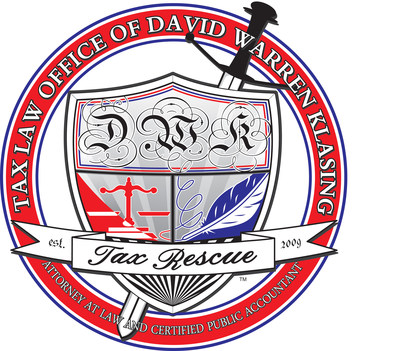From the Tax Law Offices of David W. Klasing - What Triggers State Prosecutors to Bring Tax Fraud Criminal Charges?
IRVINE, Calif., Jan. 17, 2025 /PRNewswire/ -- Every state in the union has criminal tax statutes. While different states tax in different ways, most of their criminal tax efforts function very similarly to how California goes after state tax crime.
Each year, the State of California criminally prosecutes tax crimes detected and investigated by the criminal tax investigation functions of the Franchise Tax Board (FTB), the California Department of Tax and Fee Administration (CDTFA), and the Employment Development Department (EDD). Tax responsibilities can become increasingly complicated as your assets grow, and they can become extremely complex if you own or operate a business. While there are lawful ways to keep your tax bill as low as possible, some taxpayers either skip hiring a skilled tax professional or choose an unscrupulous preparer, causing them to file returns containing false, incomplete, or misleading information. These missteps not only risk civil tax penalties but may also lead to a high-risk audit or even a California FTB, CDTFA, or EDD criminal tax investigation—culminating in California criminal tax charges that can include lengthy prison sentences, massive fines, and restitution that is non-dischargeable in bankruptcy. Below, we examine why and how these prosecutions arise and the key factors that prompt a routine California civil tax audit to escalate into a significantly worse California felony tax fraud case.
California's Criminal Tax Evasion Laws: A Broad Scope
Under California state law, it is unlawful to underpay your taxes deliberately, fail to file required returns, or knowingly submit false statements or documents on your returns. For instance, Revenue and Taxation Code § 19706 targets willful non-filing or underpayment, imposing up to one year in county jail or state prison and fines reaching $20,000. Meanwhile, Revenue and Taxation Code § 19705 addresses deliberately false tax returns, punishable by 16 months to three years in prison and fines as high as $50,000 if the state proves that you knew your data was incorrect and intended to evade your obligations. Felony convictions often bring intangible fallout: the state may include you on its "top 500" delinquent taxpayers list, broadcast your name publicly, and irreparably harm your personal and professional standing.
Sales Tax Evasion as a Prime Trigger
Many Californians assume that state tax enforcement revolves primarily around personal or corporate income. In reality, the CDTFA aggressively audits entities suspected of failing to collect or remit sales and use taxes. Businesses such as restaurants, bars, liquor stores, salons, gas stations, and convenience stores all fall under the CDTFA's scrutiny, especially when they handle significant cash transactions. A CDTFA sales tax audit typically verifies whether a "retailer engaged in California" (i.e., one selling or delivering tangible personal property within the state or possessing sufficient economic or physical nexus here) has properly assessed and submitted the correct sales tax amount for every taxable transaction.
If CDTFA auditors find evidence of a willful underreporting of cash basis sales—perhaps by omitting entire categories of transactions or employing point-of-sale manipulations—they may conclude you intentionally withheld the sales taxes due. When unreported or falsified taxable sales exceed certain thresholds (for instance, $100,000 of unreported sales in a single quarter), the CDTFA routinely notifies both the FTB and possibly the IRS Criminal Investigation Division, turning a straightforward civil tax inquiry into a felony-level tax evasion matter especially if authorities believe you deliberately falsified your books or used "zapper" or "phantom-ware" software to hide transactions.
Moreover, Revenue and Taxation Code §§ 7153, 7153.5, and 7153.6 can come into play. These provisions criminalize, for example, filing false returns "with intent to defeat or evade" a tax, failing to remit collected tax, or possessing or using an automated sales suppression device or phantom-ware to intentionally distort sales. In some cases, if the aggregated unreported tax liability hits $25,000 or more within 12 months, the offense is treated as a felony, with potential imprisonment and substantial fines (up to $20,000 for each offense). Tax or tax reimbursement that is collected but not reported is particularly damning evidence of willful wrongdoing.
At the Tax Law Offices of David W. Klasing, our California Tax Fraud Defense Attorneys & supporting CPAs have years of experience helping clients who could potentially be charged with California tax/fraud crimes bring their case to the best possible resolution. The most effective way to prevent tax fraud charges is to consult with us before filing your taxes, or at least reach out once you realize you've made a mistake—or a series of them. If we can rectify the issue before a California tax audit or criminal tax investigation is initiated, we can likely bring you back into compliance without triggering criminal tax prosecution by California prosecutors. However, if you have already been charged, our dedicated dual-licensed California litigation attorneys & CPAs will work diligently to mitigate the damage through a plea bargain or strive for a not-guilty verdict at trial, depending on the specific strengths and weaknesses of your case. To set up a reduced rate initial consultation, call us today at (888) 310-3543 or schedule online.
If you find yourself under audit in a scenario where you know for a fact you have a long history of cheating on your California income, sales or employment tax returns, we recommend the following:
- Avoid your original preparer and do not discuss your exposure with them. They are very likely to be called as a witness against you or offer your scalp in an effort to protect their own.
- Contact us before ANY communication with the California taxing authority takes place. To our knowledge, we have never had a California Audit client go to jail that we have represented.
Factors That Trigger Criminal Tax Prosecution by California Prosecutors
While California tax audits typically begin as civil inquiries, they can quickly and clandestinely escalate into a criminal tax prosecution if evidence emerges of intentional deceit. Below are some badges of fraudCalifornia prosecutors will focus on in bringing criminal tax charges:
Evidence of Intentional Non-Filing or Underreporting: Consistent failures to file or glaring discrepancies between your reported and actual income strongly suggest willful tax avoidance. If underreporting or non-filing appears too substantial or systematic for random error, California prosecutors may proceed with felony charges under Revenue and Taxation Code §§ 19705 or 19706.
Manipulated Records or Markup Audits Indicating Skimming: When the CDTFA suspects unreported cash sales, it often conducts markup audits, discarding your primary books to reconstruct the cost of goods sold by contacting your vendors directly and applying an industry-standard markup percentage to arrive at your estimated annual sales. If the computed difference is glaring, officials infer concealed sales, especially among cash-intensive operations. Discovery of a "zapper" program or missing register tapes typically implies a purposeful scheme to hide revenue, triggering felony tax charges under the appropriate California statutes.
Coordinated California & Federal Civil and Criminal Tax Leads: California's FTB, CDTFA, and EDD routinely share audit and criminal tax investigative findings among themselves and with the IRS, often exponentially compounding a taxpayer's peril. For instance, if a sales tax audit uncovers more than $100,000 of unreported cash basis sales in a single quarter, the CDTFA will routinely notify the FTB, which can then open a criminal tax investigation or adjust the entity's state income tax returns. California state freely communicates with the IRS, exposing taxpayers to parallel federal criminal tax charges if the IRS Criminal Investigation Division is informed of glaring intentional understatements, deceit or manipulations.
Reliance on a Preparer Under California or Federal Criminal Tax Investigation: If your tax preparer is suspected of orchestrating fraudulent returns across multiple clients, California prosecutors often audit all the targeted preparers client filings. Prosecutors may argue you "should have known" about artificially inflated deductions or omitted income—particularly if the errors yield disproportionately beneficial results. This approach paves the way to felony tax fraud charges under the rationale of willful ignorance.
Creation of Sham Entities or Use of Fake Exemptions: Tactics such as claiming out-of-state residency while living in California, establishing fictitious "shell" corporations to evade taxes, or repeatedly closing and reopening a business to avoid back taxes can all demonstrate willful attempts to circumvent California tax law. Investigators see these patterns as deliberate deceptions to circumvent lawful California tax obligations.
If you are worried about California prosecutors bringing tax fraud charges against you, contact our dual-licensed California civil and criminal tax defense lawyers and CPAs to gain legal guidance on how to handle this problem. We have a long track record of negotiating civil resolutions in potentially criminal tax scenarios.
Additionally, our firm has amassed years of experience handling foreign tax matters, and this experience could be used to address your offshore shell corp tax troubles. As long as a taxpayer that has willfully committed tax crimes (potentially including non-filed foreign information returns coupled with affirmative evasion of U.S. income tax on offshore income) self-reports the tax fraud (including a pattern of non-filed returns) through a domestic or offshore voluntary disclosurebefore the IRS or California state authority has started an audit or criminal tax investigation/prosecution, the taxpayer can ordinarily be successfully brought back into tax compliance and receive a nearly guaranteed pass on criminal tax prosecution and simultaneously often receive a break on the civil penalties that would otherwise apply.
Contact the Tax Law Office of David W. Klasing Today To Defend Tax Fraud Charges in California
Notwithstanding California's aggressive stance, legitimate defenses exist for taxpayers under criminal tax investigation:
- Lack of Willfulness: Proving the discrepancy was an honest miscalculation or sloppy record-keeping as opposed to intentional fraud can neutralize claims of criminal intent.
- Honest Reliance on a Professional: If you can show that you provided correct data to your preparer, and they manipulated the figures unilaterally, you may avoid liability for willful wrongdoing.
- Amended Returns or Voluntary Disclosure: Rectifying errors—before the state cements its findings—can decrease or avert felony charges significantly if the adjustments convincingly demonstrate that you intend to comply.
- Mistaken Identity or Multiple Cooks: In a corporate environment, if another person surreptitiously provided false data, you can argue you had no knowledge of or role in the misrepresentation.
At the Tax Law Offices of David W. Klasing, our distinctive blend of legal advocacy and advanced accounting proficiency positions us as a formidable ally when facing the severe ramifications of California or IRS criminal tax investigations and high-risk audits. In a climate where aggressive state enforcement can turn any apparent underreporting or questionable deduction into a felony tax charge, you need representation that addresses both the legal and financial facets of your situation simultaneously.
David W. Klasing brings decades of specialized experience handling high-risk tax civil and criminal tax controversies at both the California state and federal levels. By uniting the precision of a CPA with the strategic advocacy of a seasoned tax attorney, our team confronts complicated audits, defends against severe felony allegations, and works to minimize the life-altering fallout of a criminal tax prosecution. Whether you need rigorous pre-filing guidance to avert red flags before they attract prosecutorial attention, immediate damage control once an audit is underway, or a comprehensive trial defense after charges have been filed, our dedicated approach ensures that every aspect of your tax obligations and potential liabilities is meticulously managed. When the stakes involve your freedom, financial stability, and professional reputation, our dual-licensed expertise and unwavering commitment to protecting your best interests can be the decisive factor in achieving a favorable resolution. To set up a reduced rate initial consultation, call us today at (888) 310-3543 or schedule online here.
See our Sales Tax Q and A library
See our Audit Representation Q and A Library
See our Criminal Tax Law Q and A Library
See our Employment Tax Law Q and A Library
Public Contact: Dave Klasing Esq. M.S.-Tax CPA, dave@taxesqcpa.net
![]() View original content to download multimedia:https://www.prnewswire.com/news-releases/from-the-tax-law-offices-of-david-w-klasing---what-triggers-state-prosecutors-to-bring-tax-fraud-criminal-charges-302353829.html
View original content to download multimedia:https://www.prnewswire.com/news-releases/from-the-tax-law-offices-of-david-w-klasing---what-triggers-state-prosecutors-to-bring-tax-fraud-criminal-charges-302353829.html
SOURCE Tax Law Offices of David W. Klasing, PC


